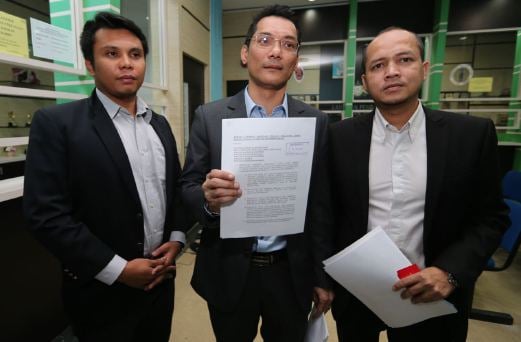- Joined
- Sep 22, 2008
- Messages
- 77,693
- Points
- 113
Apex court to hear if Muslim can be cited for wrecking non-Muslim marriage
V Anbalagan
-
November 5, 2020 2:51 PM
75Shares
 59
59
 16
16


 The Federal Court will decide if a Muslim can be made a party in a matrimonial dispute involving non-Muslim couples.
The Federal Court will decide if a Muslim can be made a party in a matrimonial dispute involving non-Muslim couples.
PUTRAJAYA: The Federal Court has allowed a housewife leave to appeal on whether a Muslim could be held liable for wrecking the marriage of a non-Muslim couple.
The apex court will proceed to hear further arguments later based on two legal questions approved today.
Judge Nallini Pathmanathan said the questions posed by the housewife, identified as AJS,
had crossed the threshold as required under Section 96 of the Court of Judicature Act.
“The questions need further arguments and it is a matter of public interest,” she said in the proceeding conducted online because of the imposition of the conditional control movement order (CMCO).
An applicant must show that the questions framed are raised for the first time and would be of public advantage and constitutional importance. The question are:
* Whether Section 3(3) of the Law Reform (Marriage and Divorce) Act (the LRA) precludes a non-Muslim petitioner from citing a Muslim as a co-respondent on an allegation of adultery for judicial separation, and
* Whether a court when interpreting Section 3(3) of the LRA should have regard to the presumption that Parliament does not intend to legislate in violation of Articles 5(1) and 8(1) of the Federal Constitution.
Lawyers Gopal Sri Ram and Ravi Nekoo represented AJS, while counsel Siew Choon Jern appeared for the respondent, identified as RIS, and the co-respondent, JBMH.
On July 6, a three-member bench of the Court of Appeal, in reversing a High Court ruling, held that a Muslim cannot be made a party in a matrimonial dispute involving non-Muslim couples.
Judge Kamardin Hashim said there was merit in the appeal,l but he did not provide the grounds for overruling the ruling.
High Court judge Faizah Jamaluddin had ruled that a co-respondent could only be named in a divorce petition and not a judicial separation, regardless of his or her religion.
In July last year, AJS filed a petition for judicial separation against her husband, known as RIS.
AJS also included JBMH, a Muslim woman, as she was said to be having an affair with RIS.
JBMH then filed an application to remove her name on the basis that the LRA did not apply to Muslims.
The identities of the parties involved have been withheld as provided for in the High Court ruling.
Siew had told the Court of Appeal on July 6 that Section 3(3) of the LRA was clear that it excluded Muslims.
“It is a blanket exclusion. The only exception is in relation to Muslim converts who had civil marriages,” he said.
Ravi, who represented AJS, said the court had to look into the legislative intent of Section 3(3). “Parliament would not have given a cloak of immunity to a Muslim who wrecks the marriage of non-Muslim couples and allow them to get away with it,” he said.
V Anbalagan
-
November 5, 2020 2:51 PM
75Shares





PUTRAJAYA: The Federal Court has allowed a housewife leave to appeal on whether a Muslim could be held liable for wrecking the marriage of a non-Muslim couple.
The apex court will proceed to hear further arguments later based on two legal questions approved today.
Judge Nallini Pathmanathan said the questions posed by the housewife, identified as AJS,
had crossed the threshold as required under Section 96 of the Court of Judicature Act.
“The questions need further arguments and it is a matter of public interest,” she said in the proceeding conducted online because of the imposition of the conditional control movement order (CMCO).
An applicant must show that the questions framed are raised for the first time and would be of public advantage and constitutional importance. The question are:
* Whether Section 3(3) of the Law Reform (Marriage and Divorce) Act (the LRA) precludes a non-Muslim petitioner from citing a Muslim as a co-respondent on an allegation of adultery for judicial separation, and
* Whether a court when interpreting Section 3(3) of the LRA should have regard to the presumption that Parliament does not intend to legislate in violation of Articles 5(1) and 8(1) of the Federal Constitution.
Lawyers Gopal Sri Ram and Ravi Nekoo represented AJS, while counsel Siew Choon Jern appeared for the respondent, identified as RIS, and the co-respondent, JBMH.
On July 6, a three-member bench of the Court of Appeal, in reversing a High Court ruling, held that a Muslim cannot be made a party in a matrimonial dispute involving non-Muslim couples.
Judge Kamardin Hashim said there was merit in the appeal,l but he did not provide the grounds for overruling the ruling.
High Court judge Faizah Jamaluddin had ruled that a co-respondent could only be named in a divorce petition and not a judicial separation, regardless of his or her religion.
In July last year, AJS filed a petition for judicial separation against her husband, known as RIS.
AJS also included JBMH, a Muslim woman, as she was said to be having an affair with RIS.
JBMH then filed an application to remove her name on the basis that the LRA did not apply to Muslims.
The identities of the parties involved have been withheld as provided for in the High Court ruling.
Siew had told the Court of Appeal on July 6 that Section 3(3) of the LRA was clear that it excluded Muslims.
“It is a blanket exclusion. The only exception is in relation to Muslim converts who had civil marriages,” he said.
Ravi, who represented AJS, said the court had to look into the legislative intent of Section 3(3). “Parliament would not have given a cloak of immunity to a Muslim who wrecks the marriage of non-Muslim couples and allow them to get away with it,” he said.



